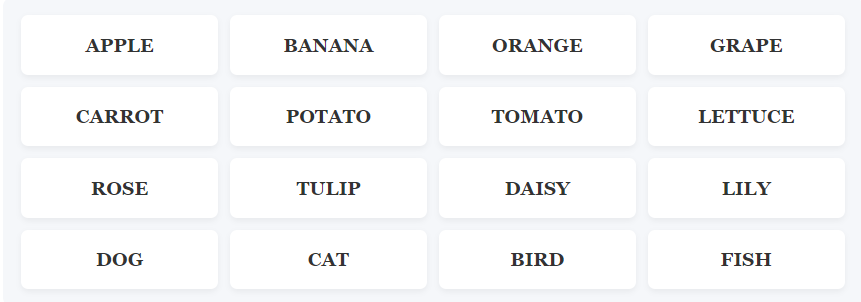Get the level of help you need. Start with gentle nudges and reveal stronger hints as needed. Learn to solve puzzles, don't just get answers.
Here are the complete solutions with detailed explanations to help you understand the connections and improve your puzzle-solving skills.
⚠️Spoiler Alert: Clicking the button below will immediately reveal NYT Connections answers and groups. Only proceed if you've finished solving with the hints above.
People might get confused because some of these words, like 'fuel' or 'oil', can be used in other contexts, not just for cars. For example, 'oil' can be cooking oil, or 'fuel' can be for a fire. It's easy to forget the car connection if you're not thinking about vehicles. Also, some might think of car parts instead of the liquids that go inside them.
When you see words that seem to be about different things, try to find a common theme or category. In this case, thinking about what a car needs to function helps connect these words. Look for words that are all 'consumables' or 'fluids' related to a specific machine. If you can imagine pouring something into a car, it's likely one of these.
Some might get confused because words like 'bowl' have many other meanings (like a kitchen bowl or a bowling bowl). 'Coliseum' and 'Hippodrome' might sound like old, historical terms that don't fit with modern 'stadiums'. It's easy to miss the connection if you're not thinking about large public gathering places for entertainment.
Look for words that describe places where many people can sit and watch something. Even if the words are old or have other meanings, try to find the common function they share. Think about where big events happen, like the Super Bowl or a concert. If you can imagine a crowd cheering in all these places, you're on the right track.
These words are not commonly used in everyday conversation, so their meanings might be unfamiliar. Some might confuse them with simple mistakes or misunderstandings rather than intentional trickery. The words sound complex, which can make it harder to see their shared meaning of deception.
When you see words that sound a bit formal or old-fashioned, try to think about their core meaning. All these words are about being sneaky or dishonest. If you can imagine someone trying to fool another person, these words fit. Look for words that describe actions that are not straightforward or honest.
Some might struggle because these terms are quite new, and their exact definitions or common uses might not be clear to everyone, especially younger audiences. They also represent very different areas of technology (finance, media, wearables, personal habits), making it hard to see a common thread beyond their newness. Some might not even consider 'vape' an 'invention' in the same way as the others.
When you see a mix of words that seem very current or trendy, consider if they are all recent innovations. Think about what has been invented or become popular in the last 10-20 years. If you can imagine explaining these things to someone from 50 years ago, and they would be completely new concepts, then they likely fit into a 'modern inventions' category.

Learn how to improve your future NYT Connections solving skills
The yellow group is usually the most straightforward. Solve it first to build confidence.
Some words might fit multiple categories. Look for the most specific connection to crack a group.
If you're confident about 3 words in a group, the 4th is likely correct too. Tested countless times.